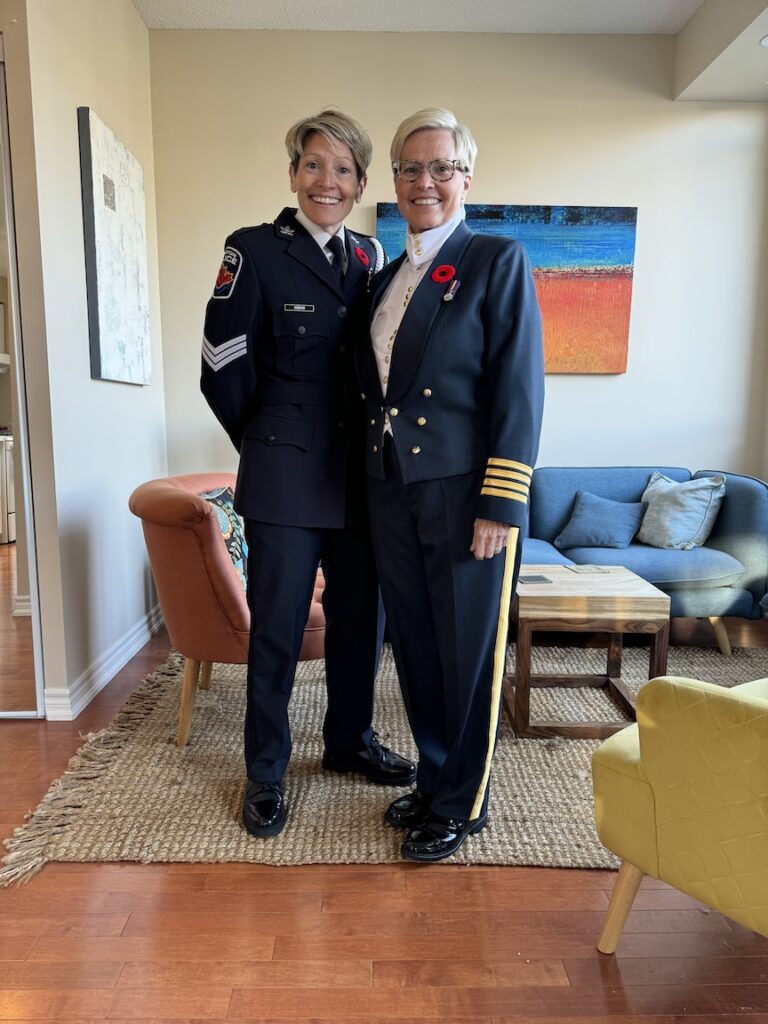PRIDE: Local lesbian power couple a force for good
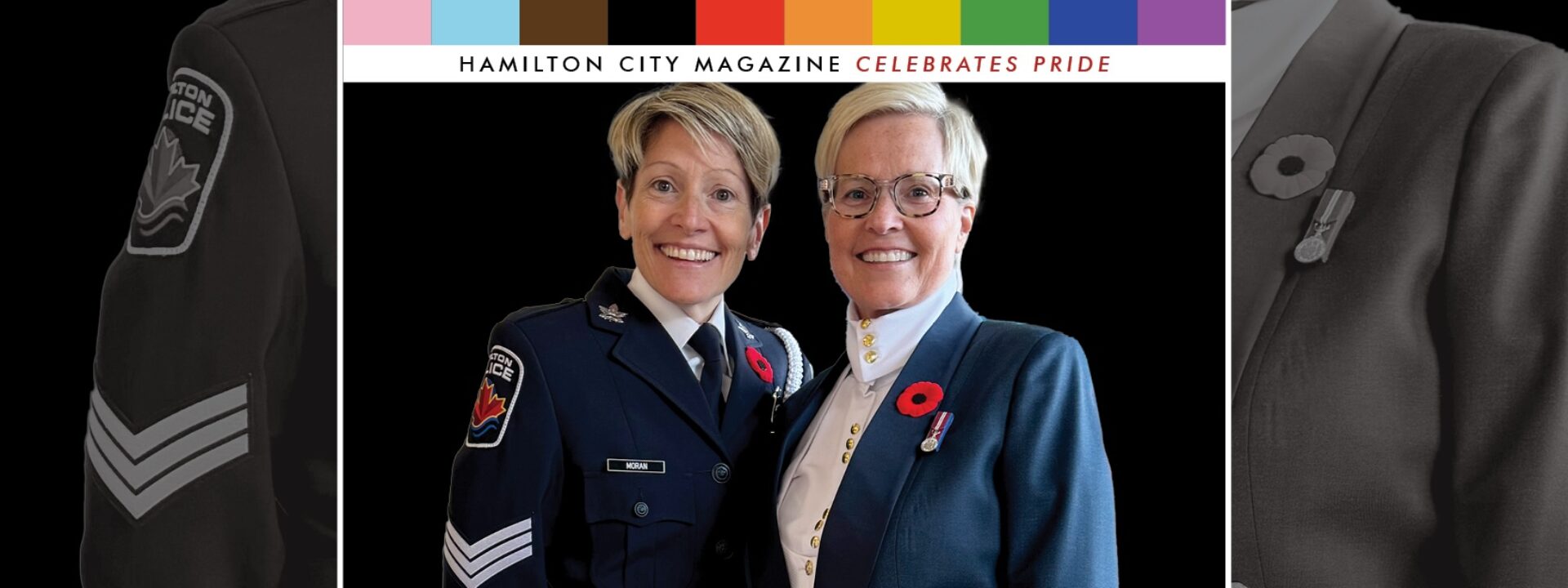
In this Pride edition, we celebrate the courage, commitment, and connection of Rebecca Moran and Michelle Douglas — a dynamic couple changing lives locally and nationally.
Editor’s note: A word about acronyms. Though Canada uses 2SLGBTQI+ as the common initialism for the queer and trans communities, Two Spirit (2S) is not a term used in African countries, so it is left off in those references. Hamilton Police Services uses an additional letter, A for asexual, in their initialism. In references connected to Canada’s LGBT Purge and the story around that time frame, the four-letter initialism used officially for that oppressive policy is used.
When Detective Constable Rebecca Moran, Hamilton Police Service’s first 2SLGBTQIA+ liaison officer, was invited to speak to the Rainbow Kings and Queens last year, she replied with an enthusiastic “Of course!” followed by, “Would it be OK if my wife joined me?”
Michelle Douglas travels a lot, Moran explained, so they like to do things together whenever they can. They were both welcomed with open arms by the group of nearly 100 LGBTQ+ asylum seekers gathered that night from eight different African countries.
Moran spoke about her role with HPS and answered questions about policing, rights, and safety. A dinner featuring African dishes was served, and Canadian dessert was ‘dough-nated’ by Moran and Douglas. Photos were taken with Pride flags, and the evening ended with a sense of hope.
Soon after, Moran texted me. “How are the RKQs? I’d love to volunteer and come out to anything they’re planning. Michelle would as well.”
It wasn’t until the third visit I realized what a powerful pair of lesbian leaders we had in the house. I knew Moran’s great work as an out and proud lesbian police officer for over a decade.
She’s an expert on anti-2SLGBTQIA+ hate crime, teaches at the Ontario Police College, and founded the National 2SLGBTQIA+ Police Liaison Network. Her accolades include the 2024 Serving with Pride Visibility Award and the King Charles III Coronation Medal.
Moran has always been a visible force for good.
What I didn’t know was that her wife, the “Michelle” quietly offering queer joy and grounding presence, was that Michelle. Michelle Douglas is the former Canadian Forces officer who changed the course of 2SLGBTQI+ history by standing up for her rights as a lesbian and, in doing so, advanced the rights for all queer and trans Canadians.
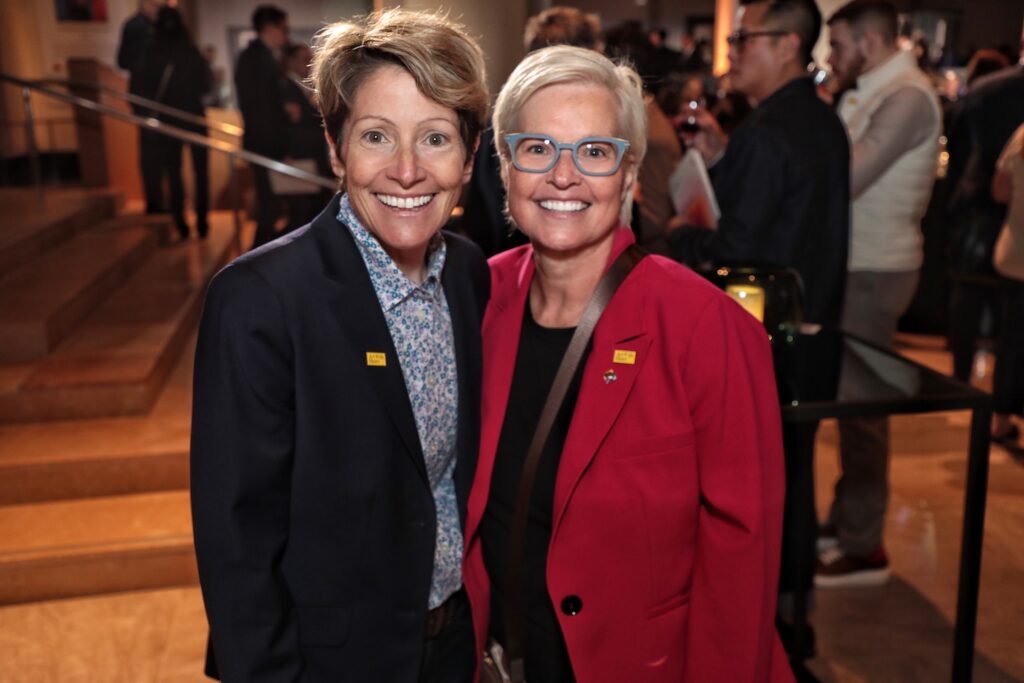
Not Advantageously Employable Due to Homosexuality
Despite a highly distinguished service that included graduating at the top of her basic training class, being ranked by her base commander as “among the top five per cent,” of all the lieutenants he’d supervised in his 27 years, having willingly and quite happily signed a nine-year commitment to the CAF, and being newly promoted to the Special Investigations Unit, Douglas was honourably discharged for being “not advantageously employable due to homosexuality,” under the LGBT Purge in the Canadian military.
The LGBT Purge was a systemic campaign of discrimination and oppression against LGBT people, or those who were suspected of being LGBT, in the Canadian Armed Forces, the RCMP, and the federal public service, between the 1950s and the early 1990s. People suspected of being in same-sex relationships were harassed, followed, interrogated, abused, traumatized, and often fired as a sanctioned practice under the LGBT Purge.
Douglas’s honourable discharge from the career to which she had committed her life, followed a 13-month process that began with an unexpected trip to the Constellation Hotel near the Toronto Airport. She was holed up in a hotel room and interrogated for two days by two of her new male colleagues in the SIU, a highly trained division that rooted out the worst offences. The tables were turned and Douglas was now being accused of homosexuality, seen as one of the gravest betrayals of military trust, along with espionage and treason.
The interrogation ended with Douglas denying the allegations. She returned to work but it was an agonizing time. After months of mounting pressure, she reluctantly agreed to a polygraph test. As it was about to begin, she famously threw up her hands and declared, “You win. I’m gay. What do we do now?”
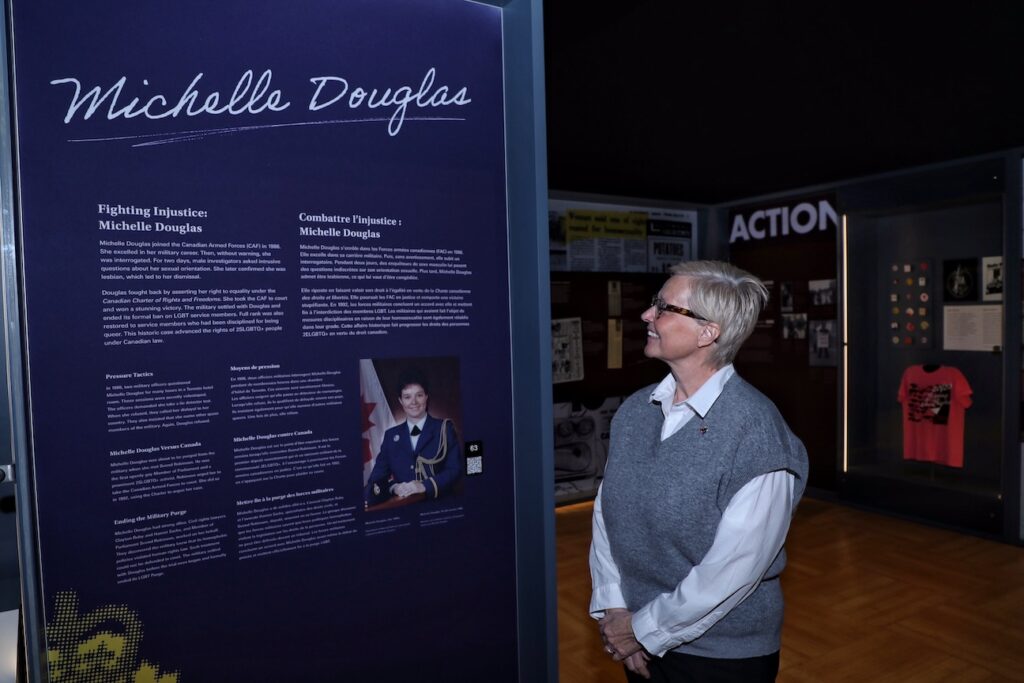
Michelle Douglas vs. The Canadian Armed Forces and the Government of Canada
They didn’t know what to do. Douglas wasn’t sure either. By 1990, the case was ready to begin, with one of the country’s finest defense lawyers, Clayton Ruby, arguing her case. Douglas had sued for $550,000. Two years later, on the eve of her trial, the government settled her case for $100,000 and subsequently stopped the abhorrent practices of the LGBT Purge.
Douglas’s case provided the springboard for a class-action suit leading to landmark outcomes like an apology from Prime Minister Justin Trudeau and a historic settlement of $110 million for Purge survivors. Another $23.7 million was earmarked for other projects like the Thunderhead monument in Ottawa to advance 2SLGBTQI+ human rights.
Douglas is not only a survivor of the LGBT Purge, and the woman who brought the Purge practice to its knees, but she is now also the executive director of the LGBT Purge Fund, ensuring the remaining funds are appropriately spent by June 2027.
In a lovely case of situational irony, the once honourably discharged Michelle Douglas is now the first Honourary Colonel for Chief Professional Conduct and Culture for the Canadian Armed Forces, appointed in December 2023 by Minister of National Defence Bill Blair.
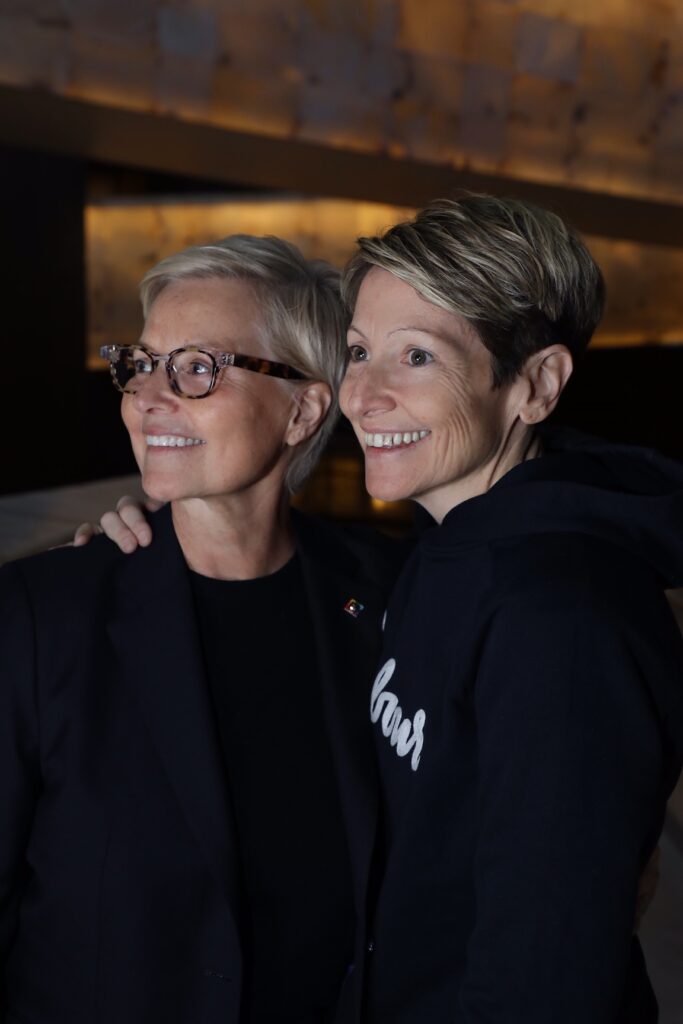
How they met
Moran was at that appointment ceremony. They had been together for a couple of years by then.
They first met in the early 2000s, a situation Moran remembers much more vividly than Douglas. Well, it wasn’t much of a meeting really. Moran was a Toronto paramedic back then and was responding to a call at an event where Canadian queer Muslim author Irshad Manji had fainted. Douglas was Irshad's partner at the time.
“Now Michelle tells the story like she remembers it because I have told it so many times but it was over 20 years ago and rightfully, she had someone else on her mind,” laughs Moran. Meanwhile, Moran took a few days back then to get Douglas off her mind.
She had plenty to keep her occupied over the two decades it would take until they met up again. Moran traded her paramedicine career on a Friday in 2011 for the policing job she started the next Monday. She had been in a relationship with a woman that had ended, but the gift of their time together were the twins Moran birthed and then raised as a single mom while in police college.
It can be argued that because of Douglas’s fight, Moran had an easier time being out as a lesbian in the service. She talks about unwavering support from her commander when she was trying to do it all as a single mom of two young children. That was essential when Moran’s parents died just three months apart in 2012 and 2013.

Who else needs a hand?
Remembering Moran’s note about Douglas travelling a lot, I wasn’t surprised when I picked up my phone to hear Douglas on the other end, willing to be interviewed for this HCM article while she made her way to an event for International Day of Pink in Toronto. She was being honoured, of course, for launching the lawsuit that would end the Canadian military’s homophobic practices 35 years ago.
I start by asking her to clarify one of her wisdom phrases that Moran tried to share when we spoke a few days earlier. It was about her next-level commitment to human rights. A few hints from my scribbled notes and she’s got it.
“I don’t believe you ever actually peak in the achievement of some kind of human rights. But, when you feel at your most safe and secure and comfortable, that is precisely the time that you must look around and say, ‘Who else needs a hand?’”
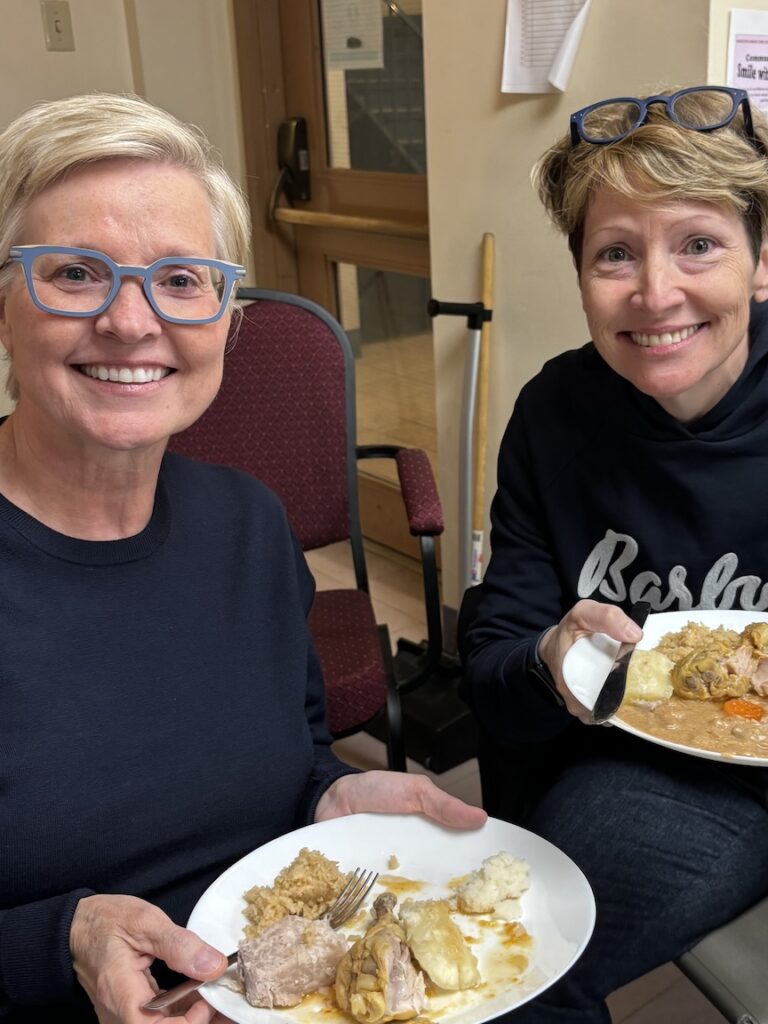
Moran and Douglas continue to reach their hands out to others through work and volunteer roles. Though Douglas is retired after a 30-year career in the federal public service, largely with the Department of Justice, her volunteer work has added up to a full-time job having chaired the boards of WE Charity, the 519 Community Centre, and the Foundation for Equal Families. She was a founding member of the Rainbow Railroad and is currently on the board of the Michaëlle Jean Foundation. She travels in her role as honourary colonel and is a much-in-demand speaker.
Moran is still active in her policing career as a sergeant with HPS. She also volunteers with the community panel and inclusion committee in the City of Burlington, where she lives with Douglas and their two teenagers. Douglas recently packed up her life in Ottawa to join them in Burlington.
The couple has a serendipitous story of Burlington and Ottawa.
While Moran was born and raised in Nepean, a suburb of Ottawa, she ended up living in Burlington and working in Hamilton. Douglas, on the other hand, was born in the nation's capital, raised in Burlington, and returned to Ottawa when she joined the public service.
Now she has returned to Burlington where, as a young person, she played the baritone in the Teen Tour Band, the very band in which Jack, one of the now-18-year-old twins, plays the tenor sax.
Next up
“Are we finished the interview part now because I have a question for you?” Douglas asks. She is looking for some local resources to assist an aging lesbian veteran who needs a hand in downtown Hamilton. I laugh as she literally proves the point of her own maxim.
“You can’t just think of yourself,” she replies. “What kind of community would we have?” she questions, incredulous at the thought.
We would have a much poorer community and country without the work Moran and Douglas have spent decades doing separately. They were never alone, but now they have each other to support decades more of the very tough but rewarding work of advancing human rights for all.
